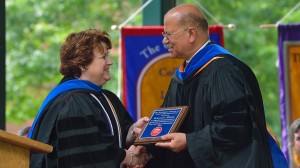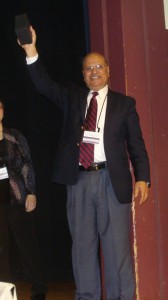
Alice Clark, vice chancellor for research and sponsored programs at the University of Mississippi, presents Mahmoud A. ElSohly with the university's Distinguished Research and Creative Achievement Award during Commencement 2013 ceremonies in the Grove. Photo by Robert Jordan/Ole Miss Communications
OXFORD, Miss. – The International Cannabinoid Research Society presented its Lifetime Achievement Award to a University of Mississippi researcher during its annual symposium in Vancouver, British Columbia.
Mahmoud A. ElSohly, a research professor in UM’s National Center for Natural Products Research and a professor of pharmaceutics, as well as president of ElSohly Laboraties Inc. of Oxford, received the award during the symposium’s June 25 awards banquet.
“This is a very prestigious award from a focused and select global group of researchers,” said NCNPR Director Larry Walker.
The ICRS is a source of impartial and reliable information about the chemistry, pharmacology, therapeutic uses and toxicology of Cannabis (aka marijuana) and its chemical constituents, called cannabinoids, as well as their behavioral, psychological and social effects. It also organizes scientific meetings to enable researchers from around the globe to meet and discuss their research.
“As president of the International Cannabinoid Research Society, it was my honor and pleasure to award the 2013 ICRS Lifetime Achievement Award to Dr. ElSohly for his sustained commitment and significant contributions to advancing cannabinoid science,” said Jenny L. Wiley, a senior fellow and senior behavioral pharmacologist at RTI International in Research Triangle Park, N.C.
The award consists of a block of crystal with the chemical structure of THC (tetrahydrocannabinol, marijuana’s main psychoactive ingredient) inside it.
“It gives me a great pleasure, an honor and much satisfaction to be selected by my peers of accomplished ICRS members to receive the Lifetime Achievement Award,” ElSohly said. “It certainly is gratifying, and I am most appreciative.”
ElSohly has been studying Cannabis and cannabinoids since joining the UM School of Pharmacy in 1975. He routinely conducts tests that reveal how potent marijuana is, whether it’s contaminated, from where it might have come and whether someone is using it.
In the 1980s and early ’90s, his work focused on analyzing marijuana seized by the Drug Enforcement Administration to develop a marijuana “fingerprinting” system that is used to trace crops to their sources globally. In recent years, he and his colleagues have developed new ways of delivering compounds in marijuana to treat a range of chronic conditions, from chemotherapy-induced nausea to neuropathic pain. They include a THC suppository and a transmucosal THC patch.
ElSohly has been director of the university’s National Institute on Drug Abuse-funded Marijuana Project since 1981. The project maintains the nation’s only legal marijuana farm and supplies marijuana and natural cannabinoids to NIDA’s Drug Supply Program, which then provides them to researchers in the scientific community studying their potential harmful and beneficial effects.
“Dr. ElSohly has published extensively in prestigious journals and has been awarded a number of patents for his work with cannabinoids and other natural products,” Wiley said. “In addition to pursuing his own research, however, he has expertly maintained and directed the Marijuana Project, supplying the high-quality product needed by scientists investigating the health effects of marijuana. Without his advocacy for this project, it is doubtful that many of the advances in our knowledge of Cannabis abuse would have occurred.”
During his career, ElSohly also played a significant role in research on Erythroxylon coca, from which cocaine, crack and other drugs are derived, and helped all branches of the military develop and implement urinalysis programs for detecting common drugs of abuse.
He was a member of a select group that developed guidelines for the Federal Drug-Free Workplace Program and implemented the National Laboratory Certification Program that undergirds those guidelines. ElSohly was an inspector for the program, and his company, ElSohly Laboratories, provides it with quality control materials. He also served on the Substance Abuse Mental Health Services Administration’s drug testing advisory board.
An internationally recognized authority on the detection, analysis and chemistry of both Cannabis and E. coca, he is the author or co-author of nearly 270 scientific publications in national and international journals and another 270 presentations at scientific meetings worldwide. He has also authored nearly a dozen chapters in books, and his own book, “Marijuana and the Cannabinoids,” is used by Cannabis researchers around the globe.
ElSohly is a member of 14 scientific societies, several of which have named him a fellow, and is one of the world’s most oft-cited authors in forensic sciences. He has been an expert witness in more than 60 military and civilian court cases, served as a DEA instructor and secured nearly 100 contracts and grants totaling more than $45 million for his research and other projects.
“He is a founding member of the ICRS and actively participates in our annual meetings,” Wiley said. “His calm and reasoned demeanor and reliance upon scientific evidence have been particularly welcome amid the recent controversies concerning medicinal and recreational use of marijuana.”
ElSohly received the University of Mississippi’s 2013 Distinguished Research and Creative Achievement Award and was named a Distinguished Alumnus by the University of Pittsburgh’s School of Pharmacy, where he earned his doctoral degree. He was also named a Legacy Laureate, an honor Pitt bestows on only a few alumni annually for their accomplishments.
“Dr. ElSohly is an exceptionally creative researcher,” Walker said. “His consistent record and leadership in Cannabis and cannabinoid research throughout his career is truly remarkable, as is his standing in the scientific community. It doesn’t surprise any of us that the International Cannabinoid Research Society has chosen him to receive its Lifetime Achievement Award.”
